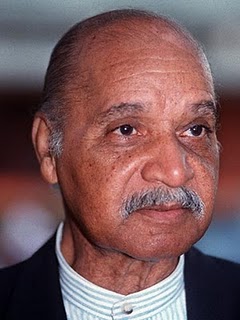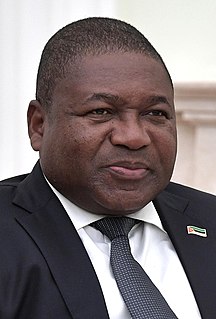Related Research Articles

Maputo, officially named Lourenço Marques until 1976, is the capital and most populous city of Mozambique. The city is named after chief Maputsu I of the Tembe clan, a subgroup of Tsonga people. Located near the southern end of the country, it is positioned within 120 km of the Eswatini and South Africa borders. The city has a population of 1,088,449 distributed over a land area of 347,69 km2. The Maputo metropolitan area includes the neighbouring city of Matola, and has a total population of 2,717,437. Maputo is a port city, with an economy centered on commerce. It is also noted for its vibrant cultural scene and distinctive, eclectic architecture.

Beira is the capital and largest city of Sofala Province, where the Pungwe River meets the Indian Ocean, in the central region of Mozambique. It is the fourth-largest city by population in Mozambique, after Maputo, Matola and Nampula. Beira had a population of 397,368 in 1997, which grew to 530,604 in 2019. A coastal city, it holds the regionally significant Port of Beira, which acts as a gateway for both the central interior portion of the country as well as the land-locked nations of Zimbabwe, Zambia and Malawi.

José Craveirinha was a Mozambican journalist, story writer and poet, who is today considered the greatest poet of Mozambique. His poems, written in Portuguese, address such issues as racism and the Portuguese colonial domination of Mozambique. A supporter of the anti-Portuguese group FRELIMO during the colonial wars, he was imprisoned in the 1960s. He was one of the African pioneers of the Négritude movement, and published six books of poetry between 1964 and 1997. Craveirinha also wrote under the pseudonyms Mário Vieira, José Cravo, Jesuíno Cravo, J. Cravo, J.C., Abílio Cossa, and José G. Vetrinha.
Luís Bernardo Honwana is a Mozambican author and statesman.

Clube Ferroviário de Maputo, or simply Ferroviário, is a Mozambique multi sports club from Maputo especially known for its football operations but also for its basketball and roller hockey team.

The Catholic Church in Mozambique is part of the worldwide Catholic Church, under the spiritual leadership of the Pope in Rome.

The People's Republic of Mozambique was a socialist state that existed in present day Mozambique from 1975 to 1990.

Filipe Jacinto Nyusi, born 9 February 1959, also spelled Nyussi, is a Mozambican politician serving as the fourth President of Mozambique, in office since 2015. His second term as President of Mozambique which started in 2020 was produced in an election which received many accusations of rigging, similar to previous elections, and this resulted in some pushback from the international community. Nyusi previously served as Minister of Defence from 2008 to 2014. He was the candidate of the ruling party, Frelimo, in the 2014 and 2019 presidential elections. He is serving as the Chairman of Southern African Development Community since August 2020. Nyusi is involved in the illegal debts that sank the economy of Mozambique, although he has not been convicted yet. This is because the judicial system of Mozambique is used as a tool to target political adversaries of Nyusi, while not investigating crimes committed by Nyusi or individuals close to Nyusi. Armando Guebuza, President of Mozambique during the time that the illegal debts were contracted, during a hearing with attorney general Ana Sheila Marrengula on 30 September 2020 indicated that Nyusi should be arrested to better clarify the illegal debts. Moreover, Nyusi was mentioned in the United States District Court of Eastern District Of New York on 20 November 2019 as having received at least 2 million Dollars in bribes in the context of these illegal debts. In a document submitted to The High Court of Justice in London in the context of these illegal debts, Credit Suisse admits adding Filipe Nyusi to the lawsuit as a defendant. His presidency has been marked by extensive abuse of power, assassinations of leaders of oppositions parties, journalists, and academics, and escalation of war in the central and northern regions of the country.
Ricardo Achiles Rangel was a Mozambican photojournalist and photographer.

Ricardo Eugênio Boechat was an Argentine-born Brazilian news anchor. He worked for newspapers such as O Globo, O Dia, O Estado de São Paulo and Jornal do Brasil. Before his death, he was active as a news director and radio anchor at BandNews FM and held a position as television anchor at Jornal da Band. Boechat won three Esso Journalism Awards. He entertained a weekly column at news magazine IstoÉ, and in 2002 authored the book Copacabana Palace.
Teodomiro Alberto Azevedo Leite de Vasconcelos was a Mozambican journalist and writer. He was a member of Associação dos Escritores Moçambicanos.
The following is a timeline of the history of the city of Maputo, Mozambique.
Gilles Cistac was a Franco-Mozambican lawyer specialised in constitutional law. He was shot and killed and political motives were suspected. The RENAMO party organised protests.

Maputo City Hall is the seat of the local government of the capital of Mozambique. The neoclassical building is located at the head of Independence Square, and was erected in 1947.
The mass media in Mozambique is heavily influenced by the government. Information in Mozambique is relayed by means of television, radio, newspapers, magazines and the internet. Radio is the most popular form of media. Media outlets are regulated by the independent Supreme Mass Media Council.

Pedro Palma was a Brazilian journalist, editor and publisher for the Panorama Regional in Miguel Pereira, Rio de Janeiro, Brazil. Palma was known for uncovering alleged corruption within the local government, and he had received death threats before his assassination.

Marcos de Barros Leopoldo Guerra, a Brazilian blogger for his blog Ubatuba Cobra in Ubatuba, Brazil. Guerra was known for his denunciation of corrupt politicians in Ubatuba and nearby São Paulo. He died after being shot by two men in his home in Ubatuba. Guerra had been receiving death threats in response to the political content of his blog prior to his murder.

Vila Algarve is a residential house in the Mozambican capital Maputo. Built in 1934 and later protected as a listed building, the building housed the Portuguese secret police PIDE/DGS until the end of the Portuguese colonial period in Mozambique. It is located at the intersection of Avenida Mártires da Machava and Avenida Ahmed Sekou Touré.

Felipe Machado is a Brazilian journalist, writer and musician. He is currently the Communications Director for Worldfund, a nonprofit organization with educational projects. His journalistic career includes leading positions at a few of Brazil's most relevant media companies, such as ‘O Estado de S. Paulo’, ‘R7’ and ‘Diário de S.Paulo’. As a writer, he produced 2 novels, 2 non-fiction works and an award-winning children's book. In music, he started in 1985 as the guitarist and co-founder of the heavy metal band Viper, playing in all the band's releases and concerts until recent days. In 2016, he also released his first solo album as singer, songwriter and guitar player named FM Solo.

João dos Santos Albasini, also named in Ronga as Nwandzengele, was an influential Mozambican journalist, writer, and political activist who advocated for the rights of indigenous Africans under Portuguese colonial rule in Laurenço Marques. He was one of the founding members of the political group O Grêmio Africano and editor, director and frequent contributor to the organization's political newspapers O Africano and O Brado Africano.
References
- 1 2 "Jornalista Paulo Machava assassinado a tiros". Confidencial (in Portuguese). 2015-08-28. Archived from the original on 2015-08-28. Retrieved 2015-08-28.
- ↑ Christoph Hantel (2006), Journalistenausbildung in Mosambik (in German), Frank & Timme, p. 185, ISBN 978-3865960566
- ↑ "Jornalista moçambicano Paulo Machava assassinado em Maputo". Público (in Portuguese). 2015-08-28. Retrieved 2015-08-28.
- ↑ "Jornalista Paulo Machava assassinado em Maputo". Folha de Maputo (in Portuguese). 2015-08-28. Retrieved 2015-08-28.
- ↑ Machava foi a enterrar, Polícia sem pistas dos assassinos e a culpa que não morra solteira